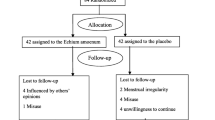Abstract
Introduction
A double-blind, placebo-controlled, randomised, parallel-group, multicentre study was conducted to evaluate the effect of a pollen-based herbal medicinal product, Femal® (Sea-Band Ltd, Leicestershire, UK), on premenstrual sleep disturbances (PSD) in women with premenstrual syndrome (PMS).
Methods
Femal, 160 mg twice-daily, was given for four menstrual cycles to 50 women, and placebo to 51 women. PSD were evaluated on a visual analogue scale prior to and after the four cycles. The effect on overall PMS symptoms was assessed with the Steiner premenstrual tension syndrome (PMTS) self-rating questionnaire. The results were analysed statistically based on intention to treat.
Results
Femal treatment resulted in a significant reduction in PSD (P<0.05) whereas placebo had no significant effect (P>0.05). In a subgroup analysis of women with irritability as their main PMS symptom cluster, the reduction of PSD was even more pronounced (P<0.001). There was no significant difference in overall degree of PMS symptom reduction between Femal and placebo when all participating women were evaluated (P>0.05). However, in women with irritability as their main PMS symptom cluster, Femal treatment resulted in a significant reduction of the Steiner score (P<0.05). The frequency of adverse events was not significantly different in women on Femal compared to women on placebo (P>0.05). No serious adverse events were recorded.
Conclusion
Femal treatment reduced PSD to a significant degree, particularly in women with irritability as their main PMS symptom. Femal treatment also reduced overall PMS symptoms in women with irritability (but not dysphoria) as their main PMS symptom. The safety of Femal and its efficacy in PSD and other symptoms in women with irritability as the main symptom cluster makes this herbal medicinal product a promising addition to the therapeutic arsenal for women with PMS.
Similar content being viewed by others
References
Dickerson LM, Mazyck PJ, Hunter MH. Premenstrual syndrome. Am Fam Physician. 2003;67:1743–1752.
Johnson SR. Premenstrual syndrome, premenstrual dysphoric disorder, and beyond: a clinical primer for practitioners. Obstet Gynecol. 2004;104:845–859.
Strine TW, Chapman EDP, Ahluwalia IB. Menstrual-related problems and psychological distress among women in the United States. J Womens Health (Larchmt). 2005;14:316–323.
Mauri M, Reid RL, MacLean AW. Sleep in the premenstrual phase: a self-report study of PMS patients and normal controls. Acta Psychiatr Scand. 1988;78:82–86.
Herr JR. Is sleep disorder treatment appropriate for premenstrual syndrome? Acta Obstet Gynecol Scand. 2003;82:99.
Winther K, Hedman C. A pollen pistil extract, Femal, reduces weight gain, irritability and dysphoric disorders in women suffering from premenstrual syndrome (PMS). In: Genazzani AR, Artini PG, Petraglia F, eds. Recent Research in Gynaecological Endocrinology. New York and London: The Parthenon Publishing Group; 2000:57–61.
Winther K, Hedman C. Assessment of the effects of the herbal remedy Femal on the symptoms of premenstrual syndrome: a randomised, double-blind, placebo-controlled study. Curr Ther Res. 2002;63:344–353.
Steiner M, Haskett RF, Carroll BJ. Premenstrual tension syndrome: the development of research diagnostic criteria and new rating scales. Acta Psychiatr scand. 1980;62:177–190.
Halbreich U, O’Brien PM, Eriksson E, Backstrom T, Yonkers KA, Freeman EW. Are there differential symptom profiles that improve in response to different pharmacological treatments of premenstrual syndrome/premenstrual dysphoric disorder? CNS Drugs. 2006;20:523–547.
Baily JW, Cohen S. Prevalence of mood and anxiety disorders in women who seek treatment for premenstrual syndrome. J Womens Health Gend Based Med. 1999;8:1181–1184.
Moline ML, Zendell SM. Evaluating and managing premenstrual syndrome. Medscape Womens Health. 2000;5:1.
Winther K, Rein E, Hedman C. Femal, a herbal remedy made from pollen extracts, reduces hot flushes and improves quality of life in menopausal women: a randomized, placebo-controlled, parallel study. Climacteric. 2005;8:162–170.
Eriksson E, Hedberg MA, Andersch B, Sundblad C. The serotonin reuptake inhibitor paroxetin is superior to the noradrenaline reuptake inhibitor maprotiline in the treatment of premenstrual syndrome. Neuropsychopharmacology. 1995;12:167–176.
Sundblad C, Wikander I, Andersch B, Eriksson E. A naturalistic study of paroxetine in premenstrual syndrome: efficacy and sideeffects during ten cycles of treatment. Eur Neuropsychopharmacol. 1997;7:201–206.
Eriksson E. Serotonin reuptake inhibitors for the treatment of premenstrual dysphoria. Int Clin Psychopharmacol. 1999;14 (suppl 2):27–33.
Freeman EW, Rickels K, Sondheimer SJ, Polansky M, Xiao S. Continuous or intermittent dosing with sertraline for patients with severe premenstrual syndrome or premenstrual dysphoric disorder. Am J Psychiatry. 2004;161:343–351.
Author information
Authors and Affiliations
Corresponding author
Rights and permissions
About this article
Cite this article
Gerhardsen, G., Hansen, A.V., Killi, M. et al. The efficacy of Femal in women with premenstrual syndrome: a randomised, double-blind, parallel-group, placebo-controlled, multicentre study. Adv Therapy 25, 595–607 (2008). https://doi.org/10.1007/s12325-008-0072-4
Published:
Issue Date:
DOI: https://doi.org/10.1007/s12325-008-0072-4




